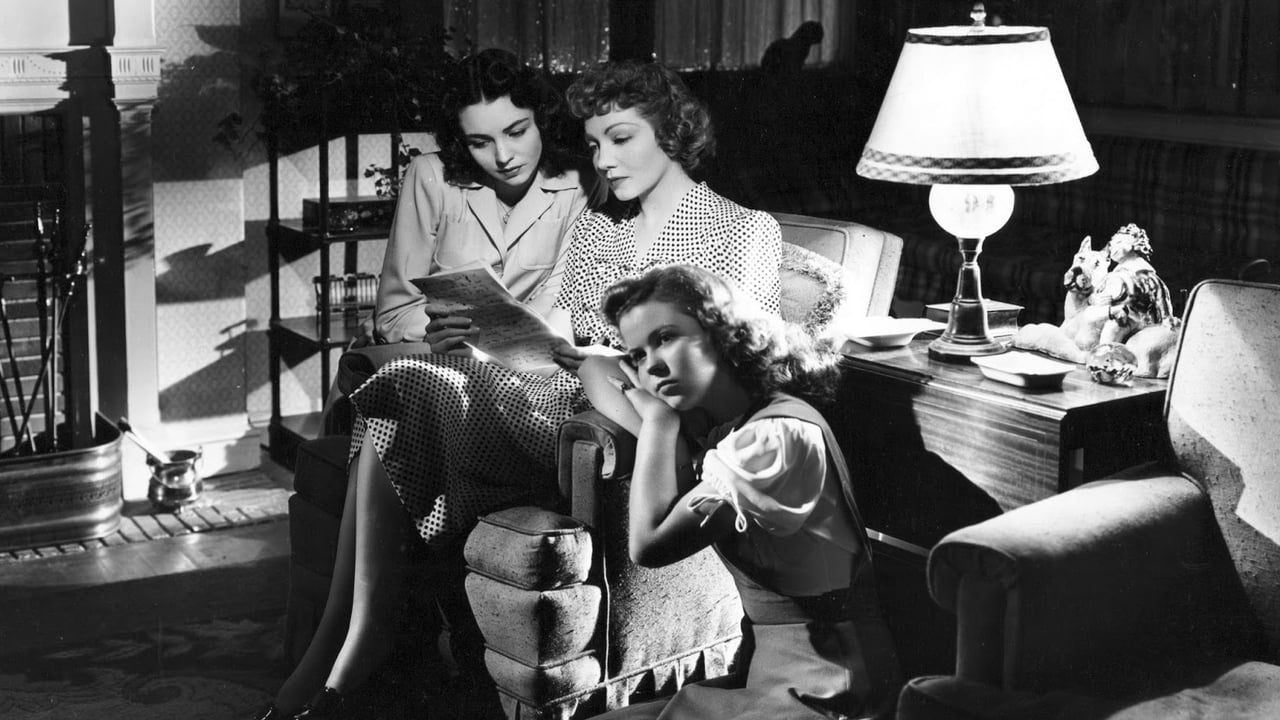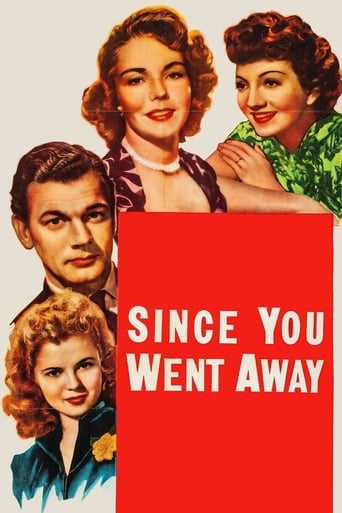

I had much the same reaction to "Since You Went Away" that I had to "Mrs. Miniver" when I finally saw it. I had preconceived notions that both were going to be schmaltzy, maudlin melodramas capitalizing on World War II audiences' emotions for maximum sentimentality. Instead, I was impressed by how thoughtful both were, and found myself quite moved by them even all these years later."Since You Went Away" doesn't carry quite the same punch, because it's not about people literally surviving warfare on their homeland. But it's still a fascinating account of what it was like for the women who were left behind when their husbands, sons, and brothers went off to war. In other war movies, women aren't given much to do but sit and pine away, clutching the occasional letter to their heaving breasts. But in this one, we see that life went on for the women one way or another. They had to put food on the table, run errands, get things done. And a certain kind of woman, played in a lovely performance by Claudette Colbert in this one, didn't know how to do any of those things because they never had to. War time, and the financial straits that came with it, meant they had to do without their maids and cooks and nannies and start doing things for themselves, planting the seeds that would eventually lead to the modern feminist movement.I could have done with less of Jennifer Jones, who plays Colbert's eldest daughter and gets a story line about doomed love with a young soldier (Robert Walker). Jones isn't much of an actress, and while the rest of the film has a practical, roll-your-sleeves-up quality, this plot strand, while I'm sure it resonated with audiences at the time, tips the film into melodrama too frequently and makes it very long. I much more enjoyed the scenes with Monty Woolley as an irascible boarder, and especially those with Agnes Moorehead, who could have been cast in every movie ever made with no arguments from me. She plays a friend of Colbert's who has the luxury of being callously blithe about everything to do with the war since she doesn't have any personal stake in it. This was something I hadn't ever really thought about with WWII, and found parallels with things going on in our country right now, like for instance the Black Lives Matter movement, an issue that lots of people care strongly about and other people have the luxury of not caring about because it doesn't affect them. It just goes to show how wrong people are when they assume old movies have nothing to say to modern audiences."Since You Went Away" was one of the big competitors at the 1944 Oscars, but it walked away with only one actual award, for Max Steiner's score. It was nominated in eight other categories, including Best Motion Picture, Best Actress (Colbert), Best Supporting Actor (Woolley), Best Supporting Actress (Jones), Best Art Direction (B&W), Best Cinematography (B&W), Best Film Editing, and Best Special Effects, a bit of a head scratcher. Many of the folks nominated for the technical awards were nominated several years earlier in the same categories for "Gone with the Wind," no big surprise as this film was one of David Selznick's attempts to recapture the grandeur and success of that earlier picture.Grade: A
... View MoreI often wondered where Margaret Buell Wilder got the title for her book. There is a song from 1922 titled, "My Buddy" that matches the melancholy mood of the movie and may provide a clue. Versions were covered in the late 30s and the 40s, to it was probably a popular tune during the War. The second verse goes:"Nights are long _since you went away_, I think about you all through the day, My buddy, my buddy, Nobody quite so true."I remember my mother, born in 1923 so she was too young to hear the original release, talk about this song and singing it once or twice in the 60s, so I believe it was popular in her young adulthood during the War. As other posts tell, "Since You Went Away" is about wartime on the Home Front, coping with rationing and shortages, making ends meet, and still trying to watch your children grow and form relationships. It's well worth watching. Again, knowing that Jennifer Jones and Robert Walker were breaking up in real life makes their performances all the more powerful. The second movie of my favorite wartime trio (probably my most favorite of the three) is "The Best Years Of Our Lives." If you haven't seen this one you need to. It involves how returning servicemen, one with no hands, try to integrate back into civilian life. An Infantry Sergeant (Al) who was a bank vice president, an Air Corps Captain and Bombardier (Fred) who was a soda jerk in a department store, and a Sailor (Homer) who left his sweetheart at home and lost his hands in combat, all try to fit back into their former lives with varying degrees of success. Look for Fredric March's drunken dinner speech about why they "couldn't take the hill because they didn't have the collateral." Hoagie Carmichael dispenses music and wisdom as Homer's uncle, the piano player in the local bar.The third in this home front trilogy is a sometimes dark movie called "Bright Victory." A sergeant from the Deep South (Florida) is blinded by a bullet and must learn to cope with never being able to see again. He is in a special training hospital that really existed in Valley Forge, PA, where all the locals knew that blind servicemen were there for rehabilitation. He makes a fast friend of another blind soldier, Joe, not knowing that Joe is a Black American. He has to learn to accept that his fiancée in Florida can't deal with his blindness and that his parents are also uncomfortable with it, he has to come to terms with his relationship with Joe, and he has to decide if he is brave enough to accept a new love to share his new life.Three powerful movies about life on the Home Front. See them!
... View MoreI saw this first on television long after the war had ended so that theoretically it had lost its relevance and sense of immediacy, nevertheless I was moved to tears several times even though I realized I (i.e. the audience) was being manipulated. I found it boasted some outstanding ensemble acting in which - in something of a contradiction i n terms - several performances could be singled out as momentous; if these were led by Claudette Colbert it is fitting as she is the very core of the film but she has first rate support from Joseph Cotton, Hattie MacDaniel, Monty Woolly and Agnes Moorhead who really nails the bitch totally lacking in self-awareness. Special mention too for the real-life husband and wife Robert Walker and Jennifer Jones who manage to convince us they are falling in love even as producer, screenwriter David O'Selznick was destroying their marriage off-screen. Even on a second viewing a good twenty years after the first I was still moved to tears in spots.
... View MoreA sentimental romantic drama directed by John Cromwell. Its World War II and many soldiers have left loved ones behind to mind the homefront. Annie Hilton(Claudette Colbert)is trying to make the best of it while her husband is away. Times get tough as she struggles to raise her two daughters, Jane(Jennifer Jones)and 'Brig'(Shirley Temple). To fortify her budget, she must take in two borders, an old ex-soldier Col. William Smollett(Monty Woolley)and a dashing Lt. Tony Willet(Joseph Cotten). The extended household pulls together putting a buffer on hardships. Melencholia starts affecting the affairs of the heart as Tony escorts Annie to functions to take her mind off of her husband at war. Jane falls in love with old Col. Willett's disowned grandson(Robert Walker), who has washed out of military school. Lt. Willet gets his orders to ship out and breaks the heart of young 'Brig', who has a teenage crush on him. M-G-M has a genuine heart warming hit on its hands. Miss Colbert is always filmed from her favorite angle while Cotten is smooth as silk. This also marks the first success of Miss Temple past her childhood. The overly talented cast also features: Lionel Barrymore, Hattie McDaniel, Keenan Wynn, Guy Madison and Agnes Moorehead.
... View More